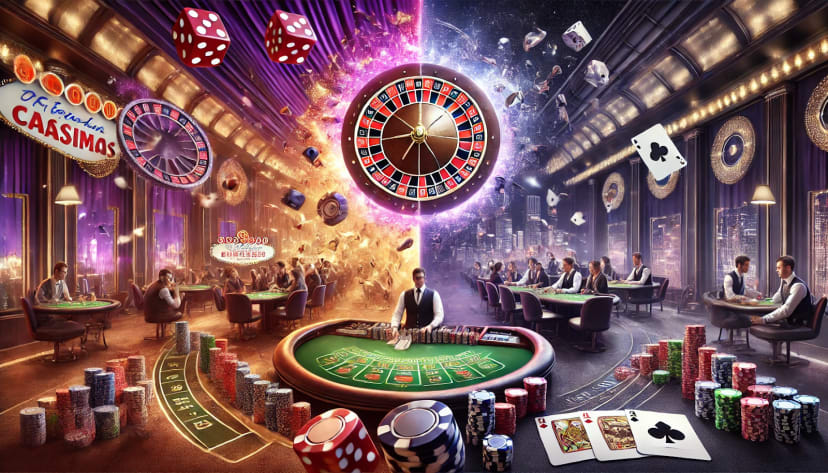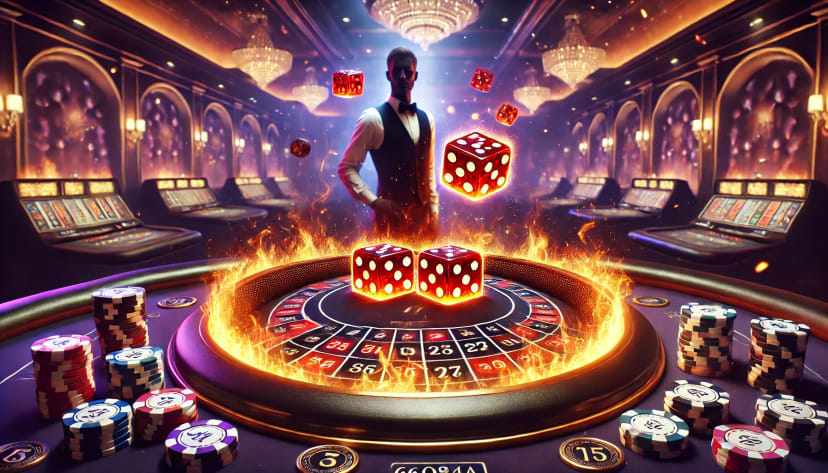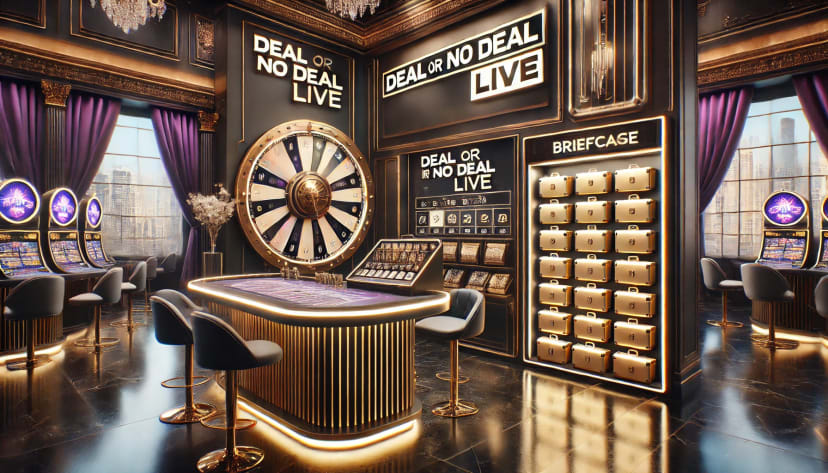Are Live Casino Games Threatening the Existence of RNG Games?

The online gambling scene in South Africa has changed dramatically over the last decade. What started as a digital version of traditional casino games using random number generators (RNG) has transformed into sophisticated live-streamed experiences with real dealers and physical equipment. This shift isn't just about technology; it's a fundamental change in how players interact with online casinos and raises questions about the future of the RNG games that have been the cornerstone of online gambling since its beginnings.
From RNG to Real-Time Streaming: The Journey
The path from simple RNG games to today's immersive live casino experiences has been paved with several tech advancements. Early live dealer games appeared around 2003, but they were held back by slow internet speeds and basic streaming tech. The experience was often jerky, with low-quality video and frequent disconnections.
The evolution of live dealer tech can be seen through these key developments:
- 2003-2006: First-generation live dealer games surface with basic single-camera setups
- 2007-2010: Multi-camera systems are introduced, offering various viewing angles
- 2011-2014: HD streaming becomes the norm as bandwidth issues diminish
- 2015-2018: Mobile optimisation revolutionises accessibility and user experience
- 2019-2022: Game show formats emerge, mixing live dealing with entertainment
- 2023-2025: AR/VR integration begins, crafting hybrid immersive experiences
This progression has turned what was once a niche offering into a major player in the online gambling world. Today's live casino studios boast broadcast-quality production, multiple camera angles, and interactive features that were unimaginable in the early days of online gambling in South Africa.
Why This Matters in the South African Market Today
The question of whether live casino games threaten RNG games has big implications for the whole gambling industry in South Africa. Market research shows that live dealer segments are growing by 15% annually, compared to 7% for traditional RNG games. Major operators are now dedicating up to 40% of their marketing budgets to live casino promotions, indicating a strategic shift towards these offerings.
Player preferences have also changed significantly. Recent surveys show:
- 62% of players under 35 prefer live dealer games over RNG alternatives
- Session times are 2.3x longer in live dealer environments
- Average bet sizes are 30% higher in live dealer games compared to their RNG counterparts
These trends have pushed operators to rethink their game selections and how they allocate resources. For tech providers and game developers, this question shapes R&D focus and product plans. For regulators, the rise of live dealer games brings new challenges in ensuring fair play and responsible gambling practices in South Africa.
How Player Behaviour is Shifting: Engagement and Experience
Human Interaction and Realism: Keeping Players Hooked
Live casino games have truly transformed player engagement through human interaction and authentic casino vibes. Players can chat with dealers and fellow gamblers, adding a social element that was missing from online gambling. This social aspect addresses a common criticism of online casinos – feeling isolated compared to land-based casinos.
The impact of seeing real cards being dealt or a roulette wheel spinning is significant. Studies show that players trust live games more than RNG games, with 74% of surveyed players expressing higher confidence in the fairness of live games, even though both formats undergo rigorous testing. This perception leads to longer playing sessions and better player loyalty.
Live dealer providers have leaned into this by improving dealer training. Dealers now get extensive coaching not just on game rules but also on engaging with players, developing personalities and even brands that players follow. This makes the experience more personal and enjoyable for South African players.
Convenience and Control: The Edge of RNG Games
Despite the popularity boom of live casinos, RNG games still hold strong advantages in convenience and player control. These games run 24/7 without needing staff, letting players jump in anytime without waiting for a seat. The pace of play is entirely up to the player – a key factor for many online casino enthusiasts in South Africa.
RNG games also offer benefits in these areas:
- Greater privacy and anonymity for players who prefer gaming solo
- Much faster gameplay, with no dealer to wait for or other players' actions to slow things down
- Lower minimum betting limits, making them more accessible to casual players
- Perfect for mobile play in situations with unstable internet connections
- Ability to play in practice mode before committing real money
These factors ensure that RNG games maintain a dedicated player base even as live casino options expand. For many players, particularly those seeking quick gaming sessions during commutes or breaks, the immediacy of RNG games remains compelling.
Game Design and Innovation Cycles
How Live Games Are Evolving Faster
The innovation pace within live casino formats has accelerated dramatically, outpacing traditional RNG development cycles. Game show hybrids like "Crazy Time" and "Monopoly Live" have created entirely new categories that blend gambling with entertainment elements reminiscent of television game shows.
These innovations extend beyond mere visual enhancements to include:
- Multiplier mechanics that dramatically increase potential payouts
- Bonus rounds requiring player decisions and interaction
- Augmented reality elements overlaid on physical game components
- Multi-game environments where players can participate in several games simultaneously
- Seasonal and themed limited-time versions of popular games
The production value of these offerings continues to increase, with Evolution Gaming's "Gonzo's Treasure Hunt Live" representing one of the first successful mergers of a popular RNG slot character with a live dealer format. This cross-pollination suggests that the boundaries between live and RNG games may become increasingly blurred.
Are RNG Games Stagnating or Adapting?
Contrary to assumptions that RNG games are stagnating, significant innovation continues in this space, albeit in different directions. The transition to HTML5 technology has revitalized older titles, making them compatible with modern devices and introducing new features impossible in earlier formats.
RNG innovation has focused on these areas:
| Innovation Area | Examples | Player Impact |
|---|---|---|
| Mechanics | Megaways, Cluster Pays, Infinity Reels | New ways to win beyond traditional paylines |
| Volatility Options | Player-selectable variance levels | Customized risk/reward profiles |
| Narrative Elements | Story progression, character development | Deeper player investment in game outcomes |
| Social Features | Tournaments, leaderboards, shared bonus rounds | Community engagement without direct interaction |
| Cross-platform Integration | Synchronized progress across devices | Seamless play transitions from desktop to mobile |
These developments demonstrate that RNG games are not standing still but evolving along a parallel track that emphasizes different player preferences and technological capabilities. The question remains whether these innovations can sustain player interest against the backdrop of increasingly sophisticated live offerings.
Platform and Operator Economics
Revenue Generation Per Player
The economic realities of live dealer versus RNG games present operators with complex considerations. Live dealer games generate significantly higher revenue per player, with average session values 2.7 times higher than comparable RNG alternatives. This revenue advantage stems from multiple factors including longer engagement times, higher minimum bets, and the psychological impact of social pressure when playing with real dealers and other participants.
Time-on-site metrics show particular divergence:
- Average RNG slot session: 18 minutes
- Average RNG table game session: 22 minutes
- Average live dealer session: 52 minutes
This extended engagement translates directly to higher revenue, with players making more bets over longer periods. Additionally, the immersive nature of live dealer games reduces the likelihood of players multi-tabling or splitting attention across multiple sites, keeping them focused on a single operator's offerings.
Cost to Host and Maintain
While live dealer games generate higher revenue per player, they also incur substantially higher operational costs. Maintaining live dealer studios requires:
- Physical studio space with sophisticated lighting and acoustics
- Broadcasting equipment and high-bandwidth streaming infrastructure
- Trained dealers working in shifts to provide 24/7 coverage
- Technical support staff to address real-time issues
- Game equipment maintenance and replacement
These expenses create a higher break-even threshold for live dealer games. In contrast, RNG games offer nearly unlimited scalability—once developed, they can serve millions of players simultaneously with minimal additional infrastructure costs. This scalability makes RNG games particularly valuable for smaller operators or those entering new markets where player volumes may initially be low.
Regulatory and Licensing Considerations
RNG Compliance and Certification
RNG games operate under well-established regulatory frameworks that have evolved over decades. These games undergo rigorous mathematical testing by independent laboratories like Gaming Laboratories International (GLI) and iTech Labs to verify randomness and expected return-to-player percentages.
The certification process typically involves:
- Source code reviews to identify potential vulnerabilities
- Statistical analysis of millions of simulated game outcomes
- Periodic retesting to ensure ongoing compliance
- Verification of game rules and paytable accuracy
This established framework provides regulatory clarity for operators and confidence for players. The mathematical nature of RNG testing also allows for precise calculation of house edges and volatility profiles, giving players transparent information about game characteristics.
Live Game Audits and Oversight
Live dealer games present unique regulatory challenges that have required adaptation of existing frameworks. Rather than focusing exclusively on random number generation, regulators must consider the integrity of physical equipment, dealer training, and real-time monitoring systems.
Regulatory approaches have evolved to include:
- Camera systems that monitor all dealer actions
- Automated card recognition technology to verify hand outcomes
- Regular physical inspection of equipment like roulette wheels and card shoes
- Dealer training certification and ongoing performance monitoring
- Incident response protocols for disputes or technical failures
These measures add complexity to compliance efforts but have proven effective in maintaining game integrity. Regulators in major jurisdictions now have specialized divisions focused on live dealer oversight, reflecting the growing importance of this segment.
Conclusion: Will RNG Games Survive the Live Casino Boom?
The evidence suggests that the future of online gambling will feature both live and RNG formats evolving in parallel rather than one replacing the other. The question is less about survival and more about adaptation and specialization. RNG games are likely to continue evolving toward experiences that capitalize on their unique strengths—privacy, pace control, complex mathematics, and unlimited scalability.
For players, this parallel evolution promises richer and more diverse gambling experiences. For operators, it necessitates sophisticated multi-product strategies rather than all-or-nothing bets on either format. The question is not whether RNG games will survive, but how both formats will transform as they respond to evolving player expectations and technological capabilities.
FAQ
What are Live Casino Games and How Do They Differ from RNG Games in South Africa?
Live casino games bring the thrill of a real South African casino to your screen, using live dealers, actual cards, and streaming tech. RNG (Random Number Generator) games, on the other hand, use computer algorithms to determine outcomes. Live games offer a social and immersive vibe, while RNG games are faster, more private, and super convenient.
Are Live Casino Games Replacing RNG Games?
No, live casino games aren't pushing RNG games out of the picture. They're more like partners in crime! Live games are hot right now because they're interactive and feel real, but RNG games are still popular because they're easy to access, quick to play, and great for gaming on your phone. Both types are evolving to keep players happy.
Why Do South African Players Love Live Casino Games?
South African players are drawn to live casino games because they feel more trustworthy, realistic, and social. Seeing real dealers and physical cards builds confidence in the game's fairness. Plus, the interaction makes the experience more engaging, leading to longer playtime and bigger bets. It's like being at the casino without leaving your couch!
How Are RNG Games Adapting to Stay Competitive in South Africa?
RNG games are stepping up their game with cool new features like Megaways and Cluster Pays, letting you tweak the volatility, adding storylines, and even throwing in social elements like tournaments and leaderboards. Plus, they're using HTML5 to make sure they work smoothly on any device, which is a must for today's tech-savvy players.
What Are the Financial and Operational Differences Between Live and RNG Games?
Live games tend to bring in more money per player because they're so engaging, but they also cost more to run – think staff, studios, and streaming. RNG games are cheaper to operate and can handle a lot of players at once, making them a good choice for operators on a budget or those targeting a wide audience.
















